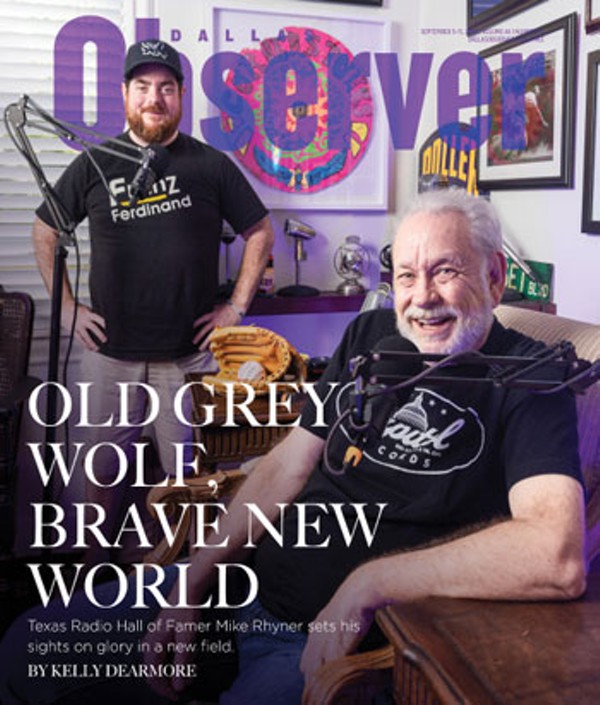No one hates Weezer’s music more than their fans.
When Pinkerton came out in 1996, fans (initially) hated it. When Weezer released Make Believe in 2005, fans (initially and to this day) hated it. When the band dropped Raditude in 2009, fans thought it made Make Believe look like Rubber Soul.
Had any other band provoked this much ire for the quality of their music, it would've been enough for everyone to disclaim their entire fandom. But California band Weezer have kept fans begrudgingly committed to the cause based largely on the strength of their self-titled 1994 debut album (often called The Blue Album), which turned 30 in May.
In celebration of Weezer’s signature release, they are playing the entire album in Dallas on Sept. 29 at the American Airlines Center, with impressive undercard support from The Flaming Lips and Dinosaur, Jr.
It’s a worthy victory lap that deserves to rest on its own laurels.
The prevailing narrative surrounding Blue is this: Grunge was having an identity crisis in the aftermath of Kurt Cobain’s death in April 1994. Some “post-grunge” bands like Creed and Collective Soul adhered to Pearl Jam orthodoxy without any reimagination and even less grit, while other bands honed a sound that somehow served as a response to grunge. During this period of uncertainty, the music video for “Buddy Holly” took MTV by storm, and before too long, the alternative rock world was listening to songs by nerds singing about nerd things. Indeed, Weezer’s ascent to the top was a triumph for nerds who loved cutting-edge rock music. But it was also a moment for people who didn’t adhere to cliques; it was for grunge fans who still liked hair metal and for the socially awkward.
One of the B-sides that somehow didn’t make the final cut for Blue was a song called “Suzanne,” which did something that no grunge band would have dreamed of doing: paying tribute to Guns N' Roses (“Even Izzy, Slash and Axl Rose / When I call you, [I] put them all on hold.”) This lyric was actually a modification of a line that would have been far more controversial had vocalist Rivers Cuomo not changed it: “Even Kurt Cobain and Axl Rose.” (It’s commonly believed this change happened because of Cobain’s death.)
Guns N' Roses were decidedly uncool at this juncture in rock music history, so for Cuomo to proudly advertise his fandom of the least cool band in the same breath as the coolest band was rather brazen. Also uncool was KISS, to whom Cuomo paid tribute in a song that did make the final cut on Blue: “In the Garage” (“I’ve got posters on my wall / My favorite rock group, KISS / I’ve got Ace Frehley / I’ve got Peter Criss.”)
The album is also rife with musical pastiches to another corny, passé band: The Beach Boys, one of Cuomo’s all-tome favorite bands. You hear it in “Surf Wax America,” between the surf rock riff and then-bassist Matt Sharp’s Brian Wilson-esque falsetto vocals in the bridge. You also hear it in the bridge for the penultimate track “Holiday,” which includes the delightfully pretentious line, “We’ll write a postcard to our friends and family in free verse.” (Would you be surprised to know that this lyric is accompanied by an equally pretentious reference to Jack Kerouac?)
All 10 tracks of Blue could be expounded on, at great length, through their own thinkpieces. The album is that devoid of filler. That may sound great, but it’s actually quite frustrating considering that “Suzanne” joins the league of other B-side tracks in not making the cut. “Mykel and Carli” is one of these tracks, and it inspired one of Jimmy Eat World’s most popular songs (“Hear You Me”) with scant recognition from mass audiences. “Jamie” is another surplus track that didn’t make the cut for Blue, and it keeps the cadence of a love song up until the end, when it is hilariously revealed that it’s a platonic statement of gratitude to their lawyer.
If any one of these tracks replaced “No One Else” or “The World Has Turned and Left Me Here,” it probably wouldn’t have changed history’s ultimate abridgment of Blue as being the game-changing album it is.
The quality of Blue is such that it justifies any fan’s perceived longsuffering for newer, high-quality Weezer albums. (We’re not going to weigh in on the merits of those thoughts.) After all, no band can make that strong a first impression without having this innate talent. And no band can make the most uncool interests cool again simply by virtue of owning the fact that they weren’t cool themselves.
Blue is a masterclass of vogue obsolescence, and it couldn’t have come at a better time in the history of 1990s alternative rock. But more than that, it’s one of Generation X’s greatest musical achievements.

Audio By Carbonatix
[
{
"name": "Air - MediumRectangle - Inline Content - Mobile Display Size",
"component": "18855504",
"insertPoint": "2",
"requiredCountToDisplay": "2",
"watchElement": ".fdn-content-body",
"astAdList": [
{
"adType": "rectangle",
"displayTargets": "mobile"
}
]
},{
"name": "Editor Picks",
"component": "17105533",
"insertPoint": "4",
"requiredCountToDisplay": "1",
"watchElement": ".fdn-content-body",
"astAdList": [
{
"adType": "rectangle",
"displayTargets": "desktop|tablet"
},{
"adType": "rectangle",
"displayTargets": "desktop|tablet|mobile"
}
]
},{
"name": "Inline Links",
"component": "18349797",
"insertPoint": "8th",
"startingPoint": 8,
"requiredCountToDisplay": "7",
"maxInsertions": 25
},{
"name": "Air - MediumRectangle - Combo - Inline Content",
"component": "17105532",
"insertPoint": "8th",
"startingPoint": 8,
"requiredCountToDisplay": "7",
"maxInsertions": 25,
"watchElement": ".fdn-content-body",
"astAdList": [
{
"adType": "rectangle",
"displayTargets": "desktop|tablet"
},{
"adType": "rectangle",
"displayTargets": "desktop|tablet|mobile"
}
]
},{
"name": "Inline Links",
"component": "18349797",
"insertPoint": "8th",
"startingPoint": 12,
"requiredCountToDisplay": "11",
"maxInsertions": 25
},{
"name": "Air - Leaderboard Tower - Combo - Inline Content",
"component": "17105535",
"insertPoint": "8th",
"startingPoint": 12,
"requiredCountToDisplay": "11",
"maxInsertions": 25,
"watchElement": ".fdn-content-body",
"astAdList": [
{
"adType": "leaderboardInlineContent",
"displayTargets": "desktop|tablet"
},{
"adType": "tower",
"displayTargets": "mobile"
}
]
}
]












